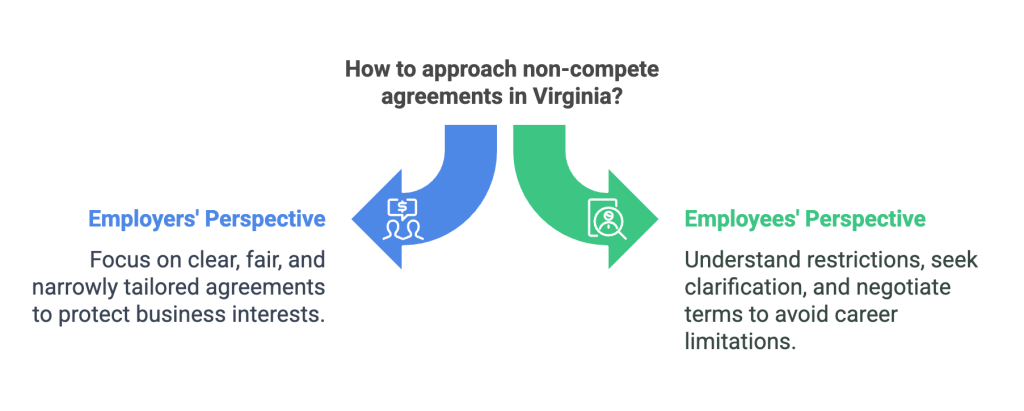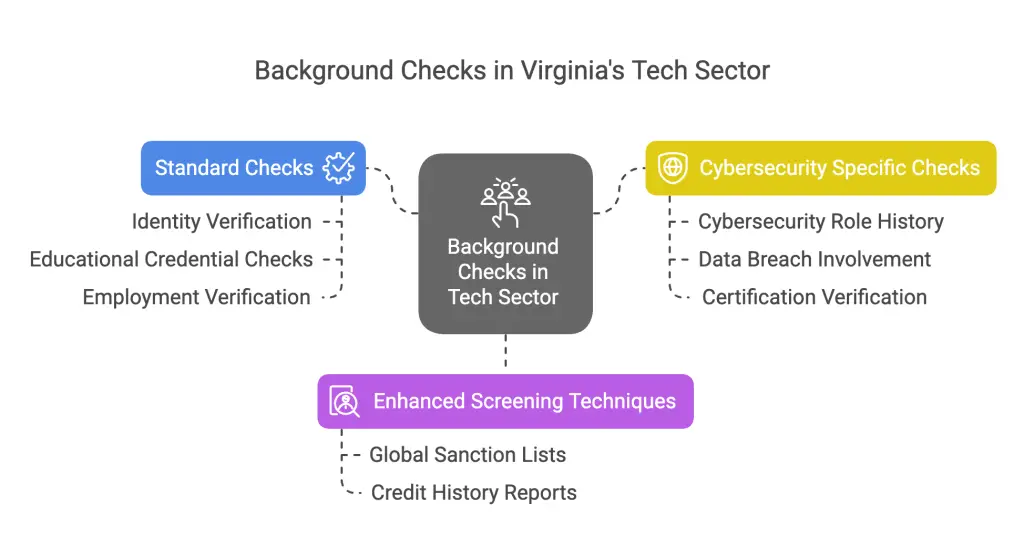Northern Virginia, often dubbed the "Silicon Dominion," has rapidly become a technological powerhouse. Home to a thriving tech industry that rivals some of the most renowned hubs across the globe, this region is a hotbed for innovation, making it a critical area for rigorous industry background checks. Whether you’re an employer aiming for compliance and competence or a job applicant eager to know what to expect, this guide will help you navigate the intricacies of Virginia tech industry checks and their unique environment shaped by cybersecurity demands and non-compete laws.
Key Takeaways
- Northern Virginia's tech sector thrives on rigorous background checks to maintain security and trust.
- Background checks in tech are crucial for protecting intellectual property and enhancing company reputation.
- Cybersecurity positions require specific screenings, including identity checks and credential verification.
- Virginia's non-compete laws require careful consideration to balance business interests and individual freedom.
- Regular review and adaptation of background check practices are necessary for legal compliance and effectiveness.
Introduction
Northern Virginia, frequently referred to as the "Silicon Dominion," is more than just a tech hub—it's a magnet for innovation and cutting-edge technology. With its rapid development and concentration of high-tech firms, the region demands robust background checks to protect its intellectual assets and ensure a reliable workforce. For tech companies, industry checks are not just about ticking boxes; they are a necessity to uphold trust and maintain operational security in a competitive field.
Background checks in this sector carry an added layer of importance. They do more than confirm educational credentials or work history; they help safeguard proprietary data and intellectual property. With cybersecurity concerns at an all-time high and tech companies under constant threat of data breaches, these checks become pivotal. In this guide, we'll explore the types of checks most relevant to the tech sector in Northern Virginia, outline the applicable legal frameworks, and offer best practices for both employers and job seekers.
The Significance of Background Checks in the Tech Industry
Background checks are fundamental in the tech industry. When you're hiring, these checks ensure you're bringing in trustworthy individuals who won't compromise sensitive information. In tech, where data is the lifeblood, this is non-negotiable.
Imagine the impact of a single security breach caused by an employee with a shady past. The stakes are high, and so are the expectations. Background checks become your frontline defense, safeguarding intellectual property and customer data. This diligence can strengthen your company's reputation. A firm known for its rigorous standards attracts the best talent and clients.
Consider how background checks give you a competitive edge. By filtering candidates who meet high ethical and professional standards, you bolster your team's strength and integrity. Have you thought about how this affects your long-term success? Employees who clear comprehensive checks help build a secure work culture, one where trust and reliability thrive.
Reflect on your own practices. Are your background checks thorough enough to catch potential issues? Regularly assessing and improving these processes ensures they align with evolving industry standards. Ultimately, these checks are not just about risk management; they're about creating a robust foundation for your tech enterprise.
Focus on Security: Northern Virginia Cybersecurity Screening
In the fast-paced world of technology, cybersecurity is paramount. Northern Virginia stands at the center of this focus, hosting numerous firms with significant cybersecurity needs. Background checks specific to cybersecurity roles are essential in this region. They ensure trust in a world where data breaches and intellectual property theft are real threats.
So, what does a cybersecurity screening entail in Northern Virginia? It typically starts with identity verification and criminal record checks. Given the sensitivity of the data handled by cybersecurity professionals, companies also conduct thorough reviews of an applicant’s credentials and previous employment, often contacting former employers to verify roles and responsibilities.
Specific to cybersecurity roles, many organizations look into the applicant's professional certifications. Certifications like Certified Information Systems Security Professional (CISSP) and Certified Ethical Hacker (CEH) are scrutinized not just for validity but for authenticity. This involves cross-referencing with certifying bodies to confirm that the candidate is indeed certified.
Industry leaders recommend incorporating credit checks, especially for positions with access to sensitive financial data. The idea is that individuals with financial difficulties may be more susceptible to external influences or misconduct. This doesn't mean disqualifying candidates based on credit alone but using it as one piece of a bigger puzzle.
Drug testing is another component, increasingly relevant in cybersecurity roles due to the high-stakes environment. While drug screening may seem unrelated, it serves as a tool to ensure that candidates can perform reliably under pressure.
Given these complexities, direct engagement with candidates about the screening process fosters transparency and reduces friction. It shows them you value security while also respecting their privacy.
In the end, a robust cybersecurity background check isn't about checking boxes. It’s about building a barrier that protects not only your company but also the proprietary data and systems that could impact a much larger community.
Legal Framework: Understanding Non-Compete Laws in VA
Non-compete agreements, also known as non-competes, are legal contracts where employees agree not to enter into competition with their employer during or after employment. The primary aim is to protect trade secrets, confidential information, and business relationships.
In Virginia, these agreements carry specific nuances. Traditionally, Virginia’s approach has been strict due to the necessity of balancing business protection with individual employment freedom. For tech companies in Northern Virginia, where innovation drives competitive advantage, careful drafting is crucial.

Successful non-compete agreements in Virginia tend to be narrowly tailored. This means they should be limited in scope concerning geography, duration, and the type of work restricted. Some basics: the agreement shouldn’t excessively restrict an employee's ability to find new work, it should serve a legitimate business interest, and it should be reasonable in scope.
For employers in Virginia, clarity and fairness in drafting are key. Explicitly define what constitutes competition and ensure the agreement is necessary to protect specific, legitimate business interests. Consulting with a legal professional well-versed in Virginia law is recommended to ensure agreements are enforceable yet fair.
Job seekers should carefully read and understand any non-compete clauses before signing. Be aware of what restrictions the agreement imposes and seek clarification where language is ambiguous. In some cases, negotiating these terms before starting a position can prevent future career complications.
Navigating non-compete agreements in Virginia’s tech sector requires a careful blend of strategic consideration and legal insight. Both employers and employees should approach these agreements with a clear understanding of their rights and obligations.
Types of Background Checks in Virginia’s Tech Sector
In Virginia's thriving tech scene, background checks are an essential part of the hiring process. Ensuring candidates are qualified and trustworthy is paramount in this high-stakes environment. Here’s what you should know about the different types of checks involved.
Standard Checks are the backbone of any hiring process. These include identity verification, which confirms the candidate is who they claim to be. Educational credential checks ensure that the applicant’s academic accomplishments match their resume. Verifying previous employment helps corroborate job history and professional experience. These checks lay the foundation for building trust with potential hires.
Enhanced Screening Techniques serve to provide a deeper insight, especially relevant in the tech industry. Global sanction lists, for instance, help identify individuals that may pose compliance risks due to international legal issues. Running credit history reports can offer a glimpse into the financial responsibility of a candidate, which may be relevant for roles handling sensitive data or financial resources.
Cybersecurity Specific Checks are increasingly crucial. For positions directly tied to handling an organization’s digital defenses, additional scrutiny is necessary. This could involve assessing the candidate’s history in cybersecurity roles or checking for any past involvement in data breaches or security violations. These checks can include more technical verifications, like assessing certifications in cybersecurity and verifying the authenticity of such credentials.

Incorporating these checks into your hiring routine can significantly boost the integrity and security of your team. In an industry where information is power, understanding the depth and breadth of an individual’s background isn’t just a formality—it’s a strategic necessity. Are your current practices covering all these bases?
Best Practices for Conducting Industry Background Checks
Conducting background checks is crucial for maintaining a safe and trustworthy work environment, particularly in the tech industry. Companies must balance the need for thoroughness with respecting individual privacy rights. Ensure your checks are comprehensive but fair by defining clear standards and sticking to them.
Compliance with federal and state laws is non-negotiable. Familiarize yourself with the Fair Credit Reporting Act (FCRA) and relevant Virginia laws. These govern how you can collect, use, and store background information. Failing to comply could lead to legal complications.
Technology can simplify the screening process. Use reliable software to collect and analyze data efficiently. Consider platforms that offer integrated solutions for identity verification, employment history, and other checks needed in tech sectors.
Regularly reevaluate your screening procedures. Legal requirements and industry needs aren't static. Periodic reviews ensure your practices stay relevant and effective. Adapting to new regulations or tools can enhance the quality and legality of your background checks.
By implementing these practices, you can better protect your company and employees while maintaining a competitive edge in the tech industry.
Preparing for a Background Check: A Guide for Job Seekers
Start by taking stock of your professional history. Conduct a self-assessment, much like a personal audit. Verify your job history, education, and any certifications you claim. This simple step will help you spot discrepancies that might arise during the actual background check. It’s better to catch and correct these before they become an issue.
Understanding the background check process can ease some of the anxieties you might have. Typically, an employer will verify your identity, employment history, and education. They might also look into any criminal records or credit history, especially in sensitive tech roles. Knowing what to expect helps you prepare and ensures you're not blindsided by any surprises.
Knowing your rights during a background check is essential. You're entitled to know if a background check is happening, and to consent to it in writing. If any issues arise, you have the right to review and dispute the information obtained. Familiarize yourself with these rights to protect yourself throughout the process.
Approach this stage with openness and honesty; it reflects well on you as a candidate who respects due diligence. Plus, being upfront about any potential issues can often yield a better outcome than letting an employer discover them first.
The Future of Industry Checks in Northern Virginia
Background checks are evolving, and Northern Virginia's tech sector is at the forefront. The incorporation of AI and blockchain will likely transform how checks are conducted, offering faster and more reliable results. AI can analyze vast amounts of data quickly, pinpointing discrepancies with greater accuracy. Blockchain, with its transparent and tamper-proof nature, provides an extra layer of security, ensuring data integrity.
Staying agile amidst changing regulations is crucial. Laws are not static, and the tech industry must adapt. Employers should regularly review their screening processes to stay compliant with federal and state laws. Implementing technological advancements while adhering to legal requirements is a balancing act that demands attention and dedication.
Striking the right balance between innovation and security is key to maintaining trust in the hiring process. Companies must ensure the measures they adopt do not compromise privacy or compliance. This means investing in technology that enhances, not endangers, their integrity.
As you look toward the future, consider the implications of these emerging trends. How will your company adapt to these changes? Are you prepared to embrace new technologies while ensuring robust security practices? These questions will shape the evolution of your background check processes in the years to come.
Conclusion
Virginia's tech industry is at the forefront of innovation, but this comes with its own set of challenges, especially in background screening practices. As you navigate this complex landscape, it's crucial to manage both procedure and perception. In Northern Virginia, known as the "Silicon Dominion," employers and job seekers must mutually uphold standards that foster trust and security.
For employers, diligent and compliant checks aren't a choice; they are a necessity. While stringent processes can enhance your reputation, remember that understanding and respecting applicant rights is equally important. Be conscious of both federal and state laws, and use reliable technology to aid your efforts.
Job seekers should stay informed and proactive. Conducting your own personal check can open your eyes to potential issues that need addressing. Familiarize yourself with the screening process so you're not caught off guard—knowledge is your ally.
The tech scene here is dynamic. It's essential to continuously adapt your strategies to align with new legal requirements and technological advancements. Whether you're hiring or seeking a new role, the shared goal is clear—a workplace that balances innovation with integrity.
Frequently Asked Questions (FAQs)
Do VA tech startups require background checks?
Yes, most tech startups in Virginia conduct background checks. These checks often cover criminal history, employment verification, and educational credentials to ensure a trustworthy work environment.
How to verify IT certifications in Virginia?
You can verify IT certifications by contacting the certifying body directly. Organizations like CompTIA and Microsoft provide online verification systems where you can check the validity of a certification using the certification number or candidate ID.
Can non-competes affect tech hiring in VA?
Yes, non-compete agreements can impact hiring. They may limit an employee’s ability to join competing firms for a certain period, affecting recruitment and job mobility within the tech industry.
Are expunged records visible to VA tech employers?
No, expunged records are not visible to employers. When a record is expunged, it is legally removed from public access and typical background checks.
Do cybersecurity roles require federal clearances in VA?
Many cybersecurity roles in Virginia require federal security clearances, especially those involving government contracts. Check the job description for specific clearance requirements.
How to handle international education verification in VA?
You can verify international education by using credential evaluation services such as World Education Services (WES). These organizations assess foreign academic qualifications and provide verification reports.
Can a misdemeanor affect tech employment in VA?
Yes, a misdemeanor can affect employment, depending on the nature of the offense and company policies. Some companies may overlook minor offenses, while others might be more stringent.
What’s the cost of tech checks in Virginia?
The cost varies depending on the depth of the check performed. Basic criminal checks might cost around $20-$50, while comprehensive checks, including employment and education verification, could be higher.
Do VA tech companies check social media?
Yes, many tech companies in Virginia review social media profiles to get a sense of a candidate's personality and professionalism. It’s good to maintain a positive and professional online presence.
How to screen remote tech workers in VA?
Screen remote workers similarly to in-office employees. Use video interviews, skill assessments, and online background check services to ensure the candidate meets your company’s standards.
Are drug tests common in the VA tech industry?
Drug testing is common, especially for roles with federal contracts or positions requiring security clearances. Many companies perform testing during the hiring process.
What are the common components of a tech interview in VA?
Interviews typically include technical assessments, coding challenges, and behavioral interviews. Employers assess problem-solving skills, technical expertise, and cultural fit.
How long does the hiring process take for tech jobs in VA?
The process can take anywhere from a few weeks to several months. It depends on the role, the company’s hiring policies, and the number of candidates interviewed.
What is the return-to-office policy for VA tech companies?
Policies vary widely. Some companies have fully returned to the office, others have adopted hybrid models, and some remain fully remote. Always check with the company for their current policy.
Definitions
Background Check
A background check reviews a candidate’s personal, educational, and professional history to confirm their identity, qualifications, and suitability for a role. Employers may verify work experience, education, criminal records, and financial history to ensure a safe and trustworthy workplace. In tech industries, these checks help protect sensitive data and intellectual property.
Non-Compete Agreement
A non-compete agreement is a legal contract that prevents employees from working for direct competitors or starting similar businesses for a set period after leaving a company. These agreements are designed to protect trade secrets and confidential information. In Virginia, they must be reasonable in scope, duration, and geographic reach to be enforceable.
Credential Verification
Credential verification ensures that a candidate’s claimed education, certifications, and professional licenses are valid. Employers contact schools, certifying bodies, and previous employers to confirm legitimacy. This process is especially important for cybersecurity roles, where industry-recognized certifications can impact hiring decisions.
Identity Verification
Identity verification confirms that a candidate is who they claim to be. Employers may check government-issued documents, Social Security numbers, or other official records. In cybersecurity and high-security industries, additional verification steps help prevent fraud and unauthorized access to sensitive systems.
Credit Check
A credit check reviews a candidate’s financial history, including debts and payment records. Employers may use this information for positions that involve handling money, financial data, or sensitive transactions. A poor credit history doesn’t automatically disqualify a candidate, but it could raise concerns about financial responsibility and risk exposure.
References
- https://scholarworks.gsu.edu/cgi/viewcontent.cgi?article=1109&context=eps_diss
- https://journals.sagepub.com/doi/abs/10.1177/0091026013495763
- https://www.rand.org/research/gun-policy/analysis/background-checks/violent-crime.html

GCheck Editorial Team
Meet the GCheck Editorial Team, your trusted source for insightful and up-to-date information in the world of employment background checks. Committed to delivering the latest trends, best practices, and industry insights, our team is dedicated to keeping you informed.
With a passion for ensuring accuracy, compliance, and efficiency in background screening, we are your go-to experts in the field. Stay tuned for our comprehensive articles, guides, and analysis, designed to empower businesses and individuals with the knowledge they need to make informed decisions.
At GCheck, we're here to guide you through the complexities of background checks, every step of the way.




